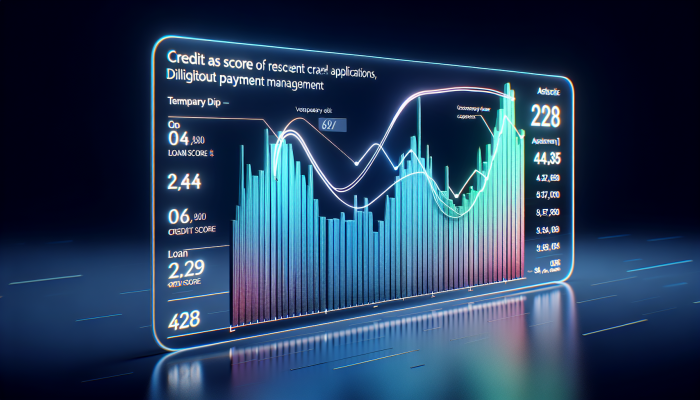Leveraging Debt Consolidation to Transform Your Credit Score for Financial Success
Implementing debt consolidation can be an impactful financial strategy that enhances your overall financial stability and health. Understanding how debt consolidation affects your credit score is essential in making informed decisions that pave the way for a secure financial future. By delving into the details of your credit score and examining the ramifications of consolidation, you can adeptly steer your financial journey with confidence and informed strategic insight.
Exploring the Immediate Impacts of Debt Consolidation on Your Credit Score

As you embark on your debt consolidation journey, it is normal to see a temporary dip in your credit score. This initial decline is typically due to hard inquiries initiated when you apply for new credit accounts, such as a personal loan or a balance transfer credit card. Lenders perform these inquiries to evaluate your creditworthiness, and each inquiry can result in a slight decrease in your score. While this early reduction may seem alarming, it is usually a brief setback rather than a permanent issue.
The initial drop in your credit score can be particularly daunting, especially if you’re already dealing with financial challenges. However, you can effectively mitigate this early decline by managing your consolidated debt with care and ensuring timely payments. By consistently fulfilling your obligations on the new loan or credit card, the impact of the hard inquiry will diminish over time, and your score will gradually improve. This phase requires patience and a robust commitment to achieving your financial objectives.
Boosting Long-Term Credit Utilization Through Strategic Debt Consolidation
One of the most valuable long-term advantages of debt consolidation is its capacity to lower your credit utilization ratio. This crucial metric assesses the relationship between your total credit card balances and your overall available credit, playing a vital role in determining your credit score. A lower credit utilization ratio indicates to lenders that you handle credit responsibly, which can significantly improve your credit profile.
When you consolidate your debts, particularly by paying off high-interest credit cards, you effectively reduce your outstanding balances. This reduction results in a healthier credit utilization ratio, ideally keeping it below the recommended 30% threshold. By maintaining a low utilization rate, you not only enhance your credit score but also position yourself as a lower-risk borrower in the eyes of financial institutions.
However, it is important to maintain this low utilization ratio after consolidation. If you begin to accumulate new debt on your credit cards following consolidation, you risk negating the positive effects on your credit score. Therefore, a disciplined approach to managing your credit following consolidation is essential for achieving lasting success.
Recognizing the Vital Importance of Payment History in Debt Consolidation
Your payment history is the most significant factor affecting your credit score, contributing approximately 35% to your FICO score. Thus, using debt consolidation to create a manageable payment plan can greatly enhance your credit profile. By consolidating your debts, you simplify your obligations into a single monthly payment, making it easier to stay organized and maintain control over your finances.
Regularly making on-time payments after consolidation will help to positively influence your credit score. Each timely payment adds a positive entry to your payment history, which can counterbalance any negative effects from hard inquiries. The longer you uphold a robust payment history, the more substantial its positive impact becomes when assessing your overall credit score.
While this journey may require discipline and perseverance, the ultimate reward is a stronger credit score and an enhanced financial standing. Therefore, it is beneficial to view debt consolidation as a strategic instrument rather than merely a temporary solution, as it can yield significant long-term benefits.
Exploring Diverse Debt Consolidation Strategies and Their Impact on Credit Scores

Acquiring a comprehensive understanding of the various debt consolidation methods is crucial, as each approach has specific ramifications for your credit score. By exploring these options, you can make informed decisions that align with your financial goals and unique circumstances.
Employing Personal Loans as an Effective Debt Consolidation Strategy
Personal loans are a popular choice for debt consolidation, enabling you to combine multiple high-interest debts into a single loan with a fixed interest rate. This method can have varied effects on your credit score. When you apply for a personal loan, it results in a hard inquiry, potentially leading to a slight decrease in your score. However, once you begin making regular payments, the positive impact on your credit score can be significant.
Additionally, personal loans often feature lower interest rates compared to credit cards, allowing you to save on interest payments while effectively managing your debt. As you reduce your consolidated debt, your credit utilization ratio improves, further enhancing your credit score.
Nonetheless, it is crucial to avoid accruing new debt while repaying your loan. This practice ensures that you maximize the advantages of debt consolidation while preserving a healthy credit score.
Utilizing Balance Transfer Credit Cards for Strategic Debt Consolidation
Balance transfer credit cards provide an appealing solution for consolidating debt. These cards enable you to transfer high-interest credit card balances to a new card that offers a lower interest rate, often featuring an introductory 0% APR. This strategy can significantly reduce your interest payments and comes with specific credit score implications.
Applying for a balance transfer card will trigger a hard inquiry, which might temporarily affect your credit score. However, if you manage to pay off your transferred balance within the promotional period, you can achieve substantial savings. Additionally, this method can lower your credit utilization ratio, resulting in a positive effect on your score, provided you maintain low balances on your other credit cards.
Conversely, failing to pay off the balance before the promotional period concludes could lead to a significant increase in the interest rate, resulting in higher payments that may strain your financial situation. Moreover, maxing out your new balance transfer card could negatively impact your credit utilization ratio, adversely affecting your score.
Utilizing Home Equity Loans for Effective Debt Consolidation Solutions

Home equity loans present another avenue for debt consolidation, leveraging the equity in your home as collateral to secure a loan. This option often comes with lower interest rates, advantageous for managing high-interest debts, but it also carries specific risks and impacts on your credit score.
While a home equity loan can help lower your credit utilization ratio and enhance your score, the potential risk of losing your home if you fail to repay is considerable. Similar to other consolidation methods, applying for a home equity loan will result in a hard inquiry, which temporarily decreases your credit score.
It is essential to carefully assess your overall financial situation before pursuing this option. If you can confidently manage the payments and avoid incurring additional debt, a home equity loan can be a valuable resource for consolidating debt while simultaneously boosting your credit score.
Effective Strategies to Mitigate Negative Impacts on Your Credit Score During Debt Consolidation
Implement the following strategies to ensure that your debt consolidation journey enhances rather than harms your credit score. These practices will assist you in navigating the complexities of consolidation while safeguarding your financial well-being.
Choosing the Best Debt Consolidation Method for Your Financial Needs
Identifying the most suitable debt consolidation method is vital for minimizing negative effects on your credit score. Take the time to thoroughly evaluate various methods, considering their pros and cons in relation to your unique financial situation.
For instance, a personal loan might be ideal if you have a stable income and a favorable credit profile, given its generally lower interest rates. Conversely, a balance transfer credit card with a lower limit may be more advantageous if your credit is less than stellar.
Conduct detailed research on different lenders, scrutinize the fine print, and ensure you fully understand the terms and conditions associated with each option. This diligence will empower you to select a method that aligns with your financial goals while minimizing adverse effects on your credit score.
Maintaining a Low Credit Utilization Ratio Post-Debt Consolidation
After completing your debt consolidation, it is crucial to sustain a low credit utilization ratio to protect your credit score. One effective strategy is to avoid accumulating new debt on your credit cards while repaying your consolidated loan. This practice helps keep your credit utilization low and positively impacts your credit score.
Furthermore, consider implementing budgeting tools to monitor your spending habits and ensure that you remain within your means. By keeping low credit card balances and making timely payments, you reinforce a positive credit history, which lenders highly value.
Another beneficial approach is to request credit limit increases on your existing credit cards. This can enhance your total available credit, thereby lowering your credit utilization ratio, as long as you avoid increasing your spending.
Building a Strong Payment History to Enhance Your Credit Score
A solid payment history is vital for improving your credit score after debt consolidation. Throughout the debt consolidation process, commit to making consistent, on-time payments. This dedication not only boosts your credit score but also fosters a sense of financial discipline.
Consider setting up automatic payments for your consolidated loan or credit card to ensure you never miss a payment. Regularly monitoring your accounts can provide added peace of mind, enabling you to address any potential issues before they escalate.
Remember that a positive payment history signals to lenders that you are a responsible borrower. Over time, this can lead to increased creditworthiness and the possibility of more favorable loan terms.
Real-World Examples: Evaluating Debt Consolidation and Its Impact on Credit Scores
To fully understand the effects of debt consolidation on credit scores, let’s explore real-life scenarios and case studies. These examples will illustrate how individuals have navigated the complexities of consolidation and the resulting impacts on their credit scores.
Case Study: Overcoming High-Interest Credit Card Debt with a Personal Loan
Consider Jane, who was burdened with overwhelming high-interest credit card debt. With multiple cards maxed out and monthly payments spiraling out of control, Jane decided to pursue a personal loan for debt consolidation.
Initially, Jane experienced a dip in her credit score due to the hard inquiry from her loan application. However, as she diligently made timely payments on her new loan, her credit score began to recover. Within a year, her credit utilization ratio had significantly decreased, resulting in a noticeable enhancement in her credit score.
Through disciplined financial management, Jane successfully transformed her financial situation, leveraging debt consolidation to regain control over her credit.
Case Study: Streamlining Student Loan Payments for Improved Management
A recent graduate, Mark, faced the challenge of juggling multiple student loans with varying interest rates. He opted for student loan consolidation to simplify his payments and potentially lower his interest costs.
Initially, Mark noticed a slight dip in his credit score due to the hard inquiry associated with his consolidation efforts. Nevertheless, his score gradually improved as he consistently made payments on the consolidated loan. Mark maintained a healthy credit utilization ratio by avoiding additional debt, showcasing the positive impact of consolidation on his credit profile.
This case exemplifies how strategic debt consolidation can yield favorable outcomes for credit scores, particularly for young borrowers.
Case Study: Effectively Managing Multiple Small Debts through Balance Transfers
Sarah had accumulated several small debts from personal loans and credit cards. She chose a balance transfer credit card with an introductory 0% APR to consolidate these obligations.
While her credit score temporarily declined due to the hard inquiry, Sarah successfully paid off her transferred balance before the promotional period ended. As a result, her credit utilization ratio improved, and her credit score steadily increased.
Sarah’s experience emphasizes the importance of managing consolidation methods effectively and illustrates the significant potential for improved credit scores through disciplined financial practices.
Dispelling Myths and Misconceptions Surrounding Debt Consolidation and Credit Scores
As with many financial topics, various misconceptions surround debt consolidation and its effects on credit scores. Let’s clarify some of the most common myths to achieve a clearer understanding of this financial strategy.
Myth: Debt Consolidation Always Leads to a Decrease in Credit Scores
A prevalent belief is that debt consolidation inherently results in lower credit scores. While it is true that hard inquiries can temporarily affect your score, debt consolidation can ultimately foster long-term improvements. By focusing on responsible payment habits and lowering your credit utilization ratio, you can significantly enhance your credit profile.
Grasping this nuance is crucial for making informed decisions regarding your debt management strategies.
Myth: All Debt Consolidation Methods Yield Identical Results
Another widespread misconception is that every debt consolidation method produces the same effects on your credit score. Different options—personal loans, balance transfers, and home equity loans—carry unique implications for your credit profile.
Each method has its own advantages and disadvantages, making it essential to evaluate them based on your individual financial situation and objectives. A tailored approach to debt consolidation can maximize its benefits for your credit score.
Myth: Debt Consolidation Eliminates Your Debt History
Some people mistakenly believe that debt consolidation erases their debt history, providing a clean slate. In reality, consolidating your debts does not eliminate your past payment history or existing balances; it merely combines them into a more manageable form.
Your credit report will still reflect your previous debts, and responsible management of the consolidated debt is crucial for demonstrating your creditworthiness. Acknowledging this fact can help you approach debt consolidation with realistic expectations.
Answering Common Questions Regarding Debt Consolidation and Its Impact on Credit Scores
How Long Will It Take for My Credit Score to Rebound After Consolidation?
Your credit score may typically take several months to recover following debt consolidation. The recovery timeline varies based on your payment patterns and overall credit utilization.
Can Debt Consolidation Improve My Chances of Obtaining Better Loan Rates?
Indeed, consolidating your debt can enhance your credit score, making you a more attractive borrower. This improvement may allow you to qualify for more favorable loan rates.
What Should I Do If My Credit Score Drops After Consolidation?
If you notice a decline in your credit score following consolidation, focus on making timely payments and maintaining a low credit utilization ratio. Over time, these actions can help rebuild your score.
Is Debt Consolidation Suitable for Everyone?
Debt consolidation may not be the ideal strategy for everyone. It is essential to assess your financial situation, including your debts, income, and spending habits, before determining if this approach is appropriate for you.
Can I Consolidate Student Loans and Credit Card Debt Simultaneously?
While both student loans and credit card debts can be consolidated, they typically require different methods. To optimize potential benefits, consider specific options tailored to each type of debt.
Will Debt Consolidation Influence My Ability to Secure New Credit?
Initially, debt consolidation may affect your ability to obtain new credit due to hard inquiries. However, with responsible management of consolidated debt, your creditworthiness can improve over time.
Are There Fees Associated with Debt Consolidation?
Some debt consolidation methods may incur fees, such as balance transfer fees or loan origination fees. It is important to be aware of these costs before proceeding with consolidation.
How Can I Identify a Reputable Debt Consolidation Service?
Research and compare various debt consolidation services, focusing on reviews and ratings from trustworthy sources. Ensure the service is transparent about fees and offers a realistic plan for managing your debts.
Is It Possible to Consolidate Debts Without a Strong Credit Score?
While a strong credit score facilitates consolidation, options are available for those with poorer credit. Consider secured loans or partnering with credit counselors to develop tailored strategies.
Can Debt Consolidation Function as a Long-Term Solution?
Debt consolidation can be part of a long-term financial strategy but necessitates ongoing discipline and responsible financial practices. Use it as a stepping stone toward a healthier financial future.
Connect with Us on Facebook
This Article Was First Found On: https://www.debtconsolidationloans.co.uk
The Article Debt Consolidation’s Impact on Your Credit Score Was Found On https://limitsofstrategy.com




You raise some important points about the immediate impacts of debt consolidation on credit scores. It’s crucial to emphasize that while the temporary dip can be disheartening, many individuals overlook the long-term benefits that consolidation can offer, especially concerning credit utilization and overall debt management.